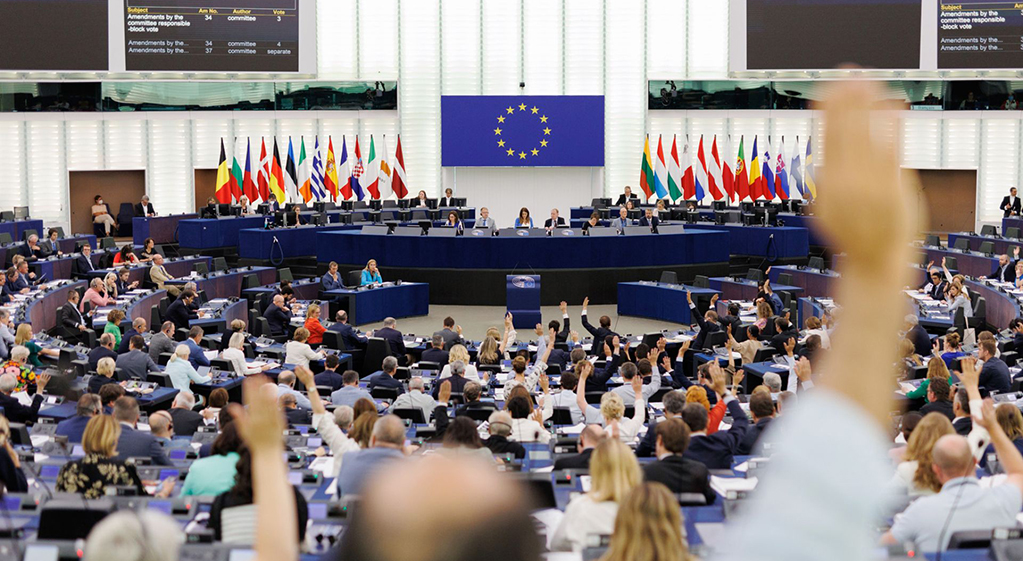Regarding the Russian law proposed by the ruling Georgian Dream, two draft resolutions have been registered in the European Parliament, one by the European People's Party (EPP) and the other by the Greens/European Free Alliance (Verts/ALE). The MEPs have initiated a proposal to impose sanctions on deputies of the Parliament of Georgia who vote for the law's adoption, as well as Georgian Dream honorary chairman Bidzina Ivanishvili. Furthermore, the resolution calls for the repeal of this law as a condition for the provision of any financial assistance intended for Georgia. The resolution is scheduled for a vote in the European Parliament on April 25.
News
In the European People's Party resolution, authored by MEPs Miriam Lexmann, Michael Gahler, Rasa Jukneviciene, David McAllister, Andrius Kubilius, and others, it is stated that the Georgian Dream party attempted to pass this law last spring but was compelled to withdraw it due to widespread protests and condemnation both domestically and internationally. This was also because the party did not want to jeopardize Georgia's chances of becoming a candidate for the European Union.
The European People's Party, which has the largest group in the European Parliament, states in their draft resolution that the European Parliament:
- Expresses grave concerns about the reintroduction of the draft law on agents of foreign influence by the Georgian Dream party in parliament; considers that the legislation is incompatible in its letter and spirit with EU values and democratic principles; highlights that the draft law violates at least two steps (1 and 9) contained in the Commission’s recommendation on Georgia’s candidate status;
- Expresses alarm that the adoption of a Russian-style agents of foreign influence act would seriously damage Georgia’s pro-European path and believes that as long as such legislation is part of the Georgian legal order, any decisions leading to recommending the launch of accession negotiations should be permanently suspended; considers that through the very act of reintroducing the draft law, in violation of public commitments made in 2023 by the authorities, Georgia’s reputation is damaged and its Euro-Atlantic aspirations are jeopardised as the draft law puts Georgia on the same path as the Russian Federation and other like-minded countries;
- Is worried that the proposed agents of foreign influence act would undermine the work of independent NGOs and media outlets, which are the best and most effective entities for scrutinising and monitoring the authorities’ activities; warns that if the law is adopted, it will weaken the system of checks and balances in Georgia;
- Believes that such legislation is contrary to the aspirations of the Georgian people; stands with the people of Georgia who are protesting against this draft law and stands by their aspirations to live in a prosperous country, free of corruption, which fully respects political freedom, free media and an open society and protects human rights;
- Considers that, if the legislation is adopted, the EU should sanction all members of the Georgian Parliament who voted in favour of it; reiterates, further, its call on the Council to consider imposing sanctions on the honorary leader of the Georgian Dream party, Bidzina Ivanishvili; calls on the Commission to make all financial assistance to Georgia conditional on eliminating this law from the Georgian legal order, should it be adopted;
- Believes that, given the possible negative effects of the agents of foreign influence act being adopted, the Commission should prepare a mid-year report on the implementation of the nine steps, and that the annual report should be presented exceptionally at the beginning of October;
- Appeals to the Georgian Dream party to refrain from further pursuing the adoption of the agents of foreign influence act and to withdraw it, in order to prevent jeopardising the prospects of a European future for Georgia;
- Instructs its President to forward this resolution to the Vice-President of the Commission / High Representative of the Union for Foreign Affairs and Security Policy, the Council, the Commission, the governments and parliaments of the Member States, the Council of Europe, the Organization for Security and Co-operation in Europe and the President, Government and Parliament of Georgia.
Georgian Dream approved the Russian Law in its first reading on April 17, which classifies media and non-governmental organizations that are financially independent from the government as Foreign Agents. The European Union, the US State Department, the United Nations, and international organizations have urged the Georgian authorities not to enact a law that contradicts the values of the European Union and poses a threat to the freedom and existence of the media and the civil sector.















